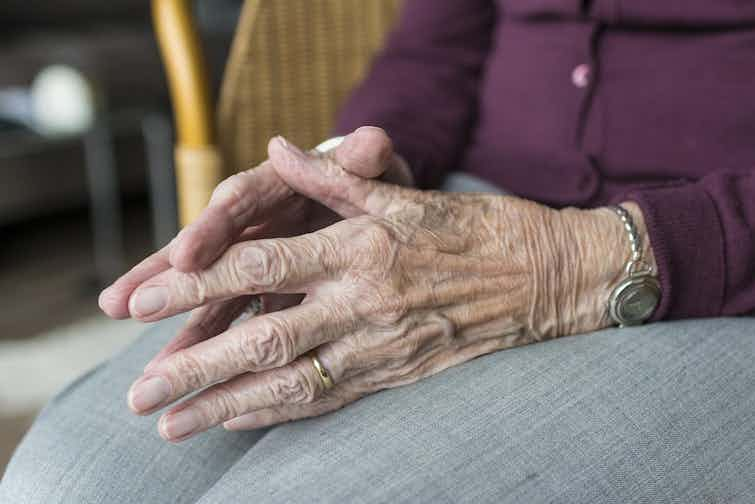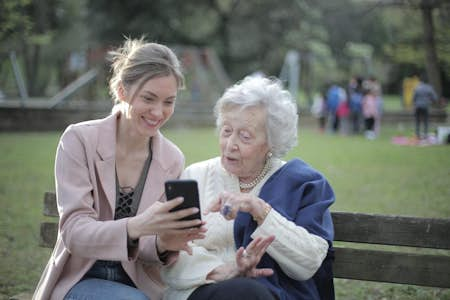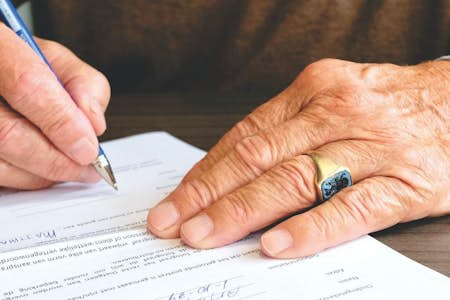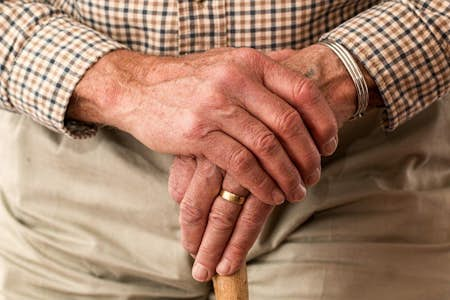As you age, your needs naturally change and evolve. One of the fundamental issues that both the elderly and those who care for them face is the need to stay connected in an emergency. It's not always practical to have someone constantly with an elderly family member. And they may not want that if they're keen to maintain a sense of purpose and independence. So for the peace of mind that makes all the difference for you and your loved ones, let's explore what to look for in a personal alarm service.
We'll look at it from the perspective of carers and those in need, allowing any family member involved in the decision-making process to help their relatives feel comfortable and safe in their homes and making connecting with emergency contacts as quick and easy as possible.
Whether you're looking for a personal alarm for yourself or something to put your mind at rest about a loved one's wellbeing, there's something for all needs in this fantastic range of caregiving and monitoring aids.
Misconceptions about personal alarms for loved ones
The most important thing to remember is that the whole objective here is to keep your ageing loved one safe. You want to be able to know that they're always protected should they need help without them literally being watched.
One of the misconceptions is that the more you watch and monitor a loved one, the safer they'll be. Imagine the extreme case of video surveillance. Is that the type of home you want your relative to live in? The life you want them to lead? You'd feel the need to constantly watch them in case something happens, simply because you can, and they won't feel like they're at home anymore. While you might feel you're unlikely to go down this route, taking it as an example is useful.
Once a loved one realises what's happening and takes exception to it, you'll soon find that they find ways around the system. Before you know it, they're actively combating the system you put in place to try and keep them safe. The whole thing becomes rather self-defeating and doesn't provide the peace of mind you and the rest of the family wanted to enjoy.
You will also find that, in many cases, your loved one can recommend how best to set up the system around their typical day at home. Look for something that won't raise false alarms every time they have a soak in the bath or a nap on the sofa, and you'll be able to get an alarm fit for purpose in every possible way.
Communicating the need for changes to your relative
You need to make your relative as involved in and aware of the process as possible. Let them know that you're thinking of making these changes, ask them what they think about them, and get their input on extra functionality that really could save their life. By making them feel like they have a say in the process, you'll be able to arrive at an alarm system that works for everyone because they won't see it as an enemy in their own home.
It's also crucial to be clear about what the alarm system can and can't do. For example, you should reassure your loved one that you're not recording their every move, action and conversation. But do let them know that should they have a fall or become unresponsive, the system will raise the alarm and send help.
Managing the transition between total independence and monitoring
The most common people to care for when you're in middle age yourself are your elderly parents. They've always been there for you and given you everything you have today, so it only feels right to you that you help them when they age and could do with an occasional helping hand. However, this is where things can sometimes get tricky, and some added sensitivity and awareness can be priceless.
Your parents raised you from the day you were born, which means they have always had a unique role in your life. They've been in charge, taken responsibility and made many of the critical decisions in your life. Just because you may be in middle age now doesn't mean they stop viewing you as their child. Why is this important to remember? Because if you suddenly start making decisions and imposing changes on them when you're 60, for example, they will be pretty surprised.
While everyone is different, and we don't pretend to know about your relationships, it's beneficial to see things from your relative's point of view. They're older and more experienced than you in many ways, so they may not fully accept the changes they feel you're mandating without their say-so.
Work through the issues together, be open and honest about your concerns, and find a simple way to sell your idea of at-home monitoring. One of the most effective is to frame it as a safety feature that gives them back their independence rather than taking it away. Let them know that their new prospective alarm system would reduce the need for people to check up on them in person constantly, and you're likely to make some headway in the discussion.
Are elderly alarm systems overkill?
Asking these questions will get you to the heart of what a pendant or watch alarm can do for you and your relative. In an age where there seems to be a fancy tech solution for anything and everything — think video doorbells and keyless ignitions — asking yourself if you really need another piece of tech is insightful.
While many pieces of tech exist solely to gather data for the company that sells them, fall detection systems add genuinely new functionality to the home. Their purpose isn't so much to track a loved one for the sake of it but to automatically alert carers and emergency services if they are needed. They also have the added advantage of learning patterns of movement and behaviour, making sure an innocent afternoon nap on the sofa isn't cause for concern.
Put all of these pieces of functionality together, and you'll soon see that an elderly alarm system with a user-friendly interface is a great way to achieve peace of mind.
How do alarm systems benefit carers?
Feeling like you must constantly check up on an ageing loved one is a sure sign that their current living arrangements are causing you stress. Maybe their abilities and coordination have suddenly reduced, you're struggling to persuade them to downsize, or you simply worry more as they age. Whatever the reason, it's vital that you, as a carer, also get the help and support that you need.
In a perfect world, you would have a nurse on call 24/7 who could appear and disappear whenever your loved one needed them, all without them feeling like they were giving over their home to someone else. But, unfortunately, that's not possible, which is why an alarm system is by far and away the next best thing.
Charities like Age UK can advise you on free schemes, many of which come with 30-day no-obligation home trials, so you can find a system that works for everyone. And if you choose to buy one independently, they're typically low-cost, highly secure and quick and easy to get set up.
These systems provide continuous monitoring and oversight and allow you to switch off and recharge your batteries. Many can be set up so they check in automatically with your phone via an app throughout the day, letting you know that everything is okay and the system is functioning as it should be. This eliminates the urge to phone or check on them in person continually. Ideal if you want to ease the stress and emotional burden you may feel is being placed on you right now.
Alarm systems with 24-hour monitoring
Charities like Age UK often recommend investing in a comprehensive UK-based system connecting the home with a staffed response centre. By being able to engage a responder automatically should a fall or other accident occur, a skilled care team will effectively always be watching over the alarm user.
Aside from household budget, another potential issue with this is the feeling of a loss of independence. When caring for an ageing loved one, this is important because you want them to be happy and at peace with the solution you implement.
Imagine if you were at home and the next day, someone arrived and installed a complex system you felt was always watching over you. Your mobile phone would seem like it was now a surveillance device, you'd find an SOS button that wasn't there before, and you'd have concerns about what the monitoring centre you keep hearing about is for. Finding the right balance here is all about open and honest conversations that ensure everyone is on the same page from day one.
More discreet emergency button-based solutions
Taking care of someone in a way that allows them to access the help of emergency services when needed is all about usability. An overly complex and hard-to-use system will soon become an afterthought and become bypassed, making the monthly subscription you pay largely worthless.
This is where a simple pendant alarm comes into its own if you're looking for a robust and largely unobtrusive fall alarm. Many of them work by GPS tracking, constantly checking the location of your loved one to try and identify falls. The clever part is that many will build up a catalogue of typical movements and activities — such as watching an afternoon TV show or taking a mid-morning nap — and highlight changes from the norm. Some will sound an alarm call designed to gently nudge the wearer just in case all they're doing is having an impromptu, one-off nap. If no response comes, they will escalate the issue to a customer service team or emergency services, who will take over.
How easy is it for an elderly user to operate a fall detector?
Wearable tech is designed to be simple and easy for users of all ages to get to grips with. Many of them also have large buttons that are compatible with loss of fine motor function with age. The battery life will vary from device to device, depending on which one is chosen, but it's typical to get six months or more with frequent warnings well ahead of time that a replacement battery is needed. There are also a growing number of fall detection systems for independent living that are USB-chargeable. Something as simple as taking it off at night and charging it on the bedside table is a habit that can quickly be ingrained and ensure that the wearer is always safe.
Are fall detectors suitable for homes without regular smartphone users?
Yes, that's the short answer! Relying mainly on a landline to stay connected is not an impediment when shopping for these types of safety systems, and nor should it be. The GOV.UK site is a valuable source of information for anyone looking to upgrade and make their home more digital. Still, you shouldn't feel like you have to do this just to make things safer.
Many pendant or wrist-based alarms have simple integrated displays that allow the wearer to reset them, avoiding false alarms easily. Ideal if you want to install a simple system that will give everyone involved the peace of mind that makes all the difference.
How can emergency services gain access in the event of a fall?
Key safes are an increasingly common feature in homes across the UK and allow anyone to grant access to a select few to their home. Most common key safes cost as little as £20, are available on next-day delivery, and can be mounted outside the property with nothing more than some basic DIY.
The great thing about this is it gives homeowners the piece of mind that the help they need will promptly arrive should an accident happen. It also allows for a simple and secure access solution to be arranged at virtually zero cost with no expensive setup fees. Ideal if you want to order something with the touch of a button that will securely control access to the property.
How can you safely give out the key safe combination?
Many fall detection systems will allow you to program a text-based response that displays in the event of an emergency. This would then allow you to display the combination to the key safe in a secure manner, so only those who receive the emergency alert get the combination code.
The most important thing to do is ensure that the key safe is well-maintained and mounted somewhere easily accessible. Because of the secure nature of the safes, there's no requirement to mount them out of sight. Many people keep things simple by mounting their safe where you would expect to find the doorbell.
Understanding fall detection system base units
The base unit is one piece of terminology you will hear about when looking into personal alarms. Fall detection systems typically comprise a sensor or pendant worn by your relative and a base unit that tracks activity and sends off the data via the internet. Think of it like the brain that allows the sensor your loved one is wearing to raise the alarm and contact emergency services.
In virtually all cases, you must ensure a landline that the base unit can connect to. Base units are typically small and compact and require little to no interaction with the householder. This allows you to place an unobtrusive but potentially life-saving addition into their home with minimum effort. Perfect if you want them to still feel independent and able to rest and relax in the privacy of home.
Which brand of fall detection system is best?
There are many different brands out there, and that can make choosing which one to entrust the safety of your loved one to challenging in the extreme. Rather than searching for the most popular devices on Amazon and eBay, look at elderly care charities like Age UK, and see which devices they recommend. This will give you the benefit of their experience and knowledge, as well as the reassurance that you're buying something fit for purpose, as opposed to something that has eye-catching and engaging marketing material.
The best approach to finding personal alarms for caregiving
The most important thing to do is assess the needs of the loved one, or older people, you're caring for. And if you're the intended user of the alarm, it's essential that you feel comfortable and at peace with how it works, too. Beginning your search by speaking with your doctor will allow you to quickly and easily assess your needs and make an informed decision about the level of telecare services required. You can then look at options like wearable tech, wristbands and SIM card powered devices. If in doubt, work together as a team and find something you're all comfortable with. Only then will you find a way to stay safe that works for everyone.












